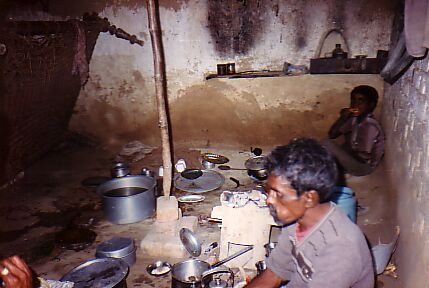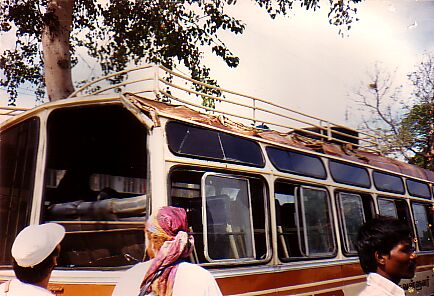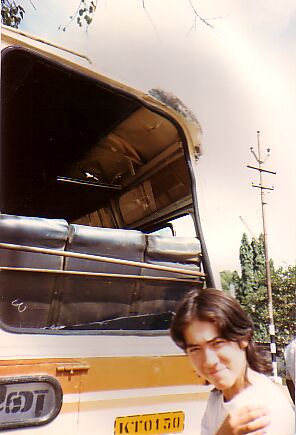
Yet another trishaw-man approached and pedalled slowly along beside us. We would eventually choose one to take us to the Taj Mahal, but, for now, we felt like doing a bit of walking, a desire the trishaw-men never seemed to understand. At least this one had the courtesy to address my wife as well. She gets very annoyed by the tendency all too common in Asia to ignore the woman and speak only to her male partner.
"We are from Australia," I replied, and waited for the usual reference to Alan Border, captain of the Australian cricket team. But no, this must have been one of the few Indians who were not fanatical about cricket. Instead, he told us he had had many customers from Australia before, and held up a tattered notebook as proof. He flipped through and pointed out a picture of a young couple standing beside his trishaw, with their names and a Sydney address scrawled over it.
"My name Ali. Ali very good guide," he told us with a toothy grin. "Speak English very good. You can see my book please." And he flipped over a few pages. "Many people your country. America, France, England. All happy with Ali. Please, you read."
The book was full of postcards, photographs and, especially, short testimonials about Ali's performance as a guide, many of them several years old. He kept talking as we read some of the comments.
"Ali very good. I take you see Taj Mahal, many famous places. You pay only little bit money."
He pointed to a comment from someone from Canada. "You should go with Ali. He is honest and will look after you well. It was nice to have a driver who speaks good English and knows the places that are worth seeing. Thanks Ali."
He turned the page, where we saw a photo of Ali between two smiling blonde girls, signed "Good luck from Inge and Karla, Sweden."
He indicated another comment, written by somebody from the United States. "Be careful. Ali is okay, but don't let him take you to carpet shops." Why would Ali draw our attention to this one? When we flipped through the book, we found several other warnings and negative comments displayed as proudly as the totally favourable testimonials. Either Ali was indeed very honest or, more likely, he could not read.
We would need a driver eventually and Ali was probably as good as any, so we listened to his proposal. He offered to take us to three major sights, beginning with the Taj Mahal, for 30 rupees, a very reasonable price, so we agreed, without feeling the need to bargain.
Ali clapped his hands together happily. "Maybe you pleased with Ali, after you write in Ali's book too. You will say Ali very good man." He smoothed out the small rug on the seat of the trishaw and indicated to us to take our places.

After our sightseeing, as expected, Ali tried to persuade us to visit a carpet shop. "Just see. You don't buy, no problem." Having read the fine print in his publicity material, we declined. However we agreed to him taking us to a restaurant that he recommended for lunch. He pedalled us to a rather large but isolated eating house a little way out of town. We invited him to join us, but he disappeared, saying the restaurant would provide him with lunch. Obviously this was, either partly or in full, his commission for bringing us here, so, one way or another, we were paying for his meal anyway.
After lunch, Ali made us a proposal. He offered to guide us for the next two days for a further fee of only 20 rupees. We were immediately suspicious. What was the catch? We soon found out. "I take you everywhere, see everything. Only you let me take you to some shops. Maybe carpets. Maybe Moghul painting. You look only. You don't buy, no problem."
"But if we don't buy, you don't get commission. It is no good for you, because we do not want to buy anything."
Ali grinned widely. "I bring you to shop, they give me money, even you don't buy. Good business for me."
It sounded like a good deal. We would get a guide and transport almost free, and Ali would make a fortune from the unsuspecting shopkeepers. No doubt he would get more money if we actually bought something, but we did not need to feel he was disadvantaged as he assured us he would get enough to make it worth his while.
So we alternated between tourist sights and various shops, where the vendors consistently failed to sell us carpets or any other souvenirs.
Ali asked us our opinion of the restaurant where he had taken us for lunch. "It was okay," I said. "But a bit expensive. We have had better and cheaper food." No doubt Ali's presence had added to the expense of the food, but he nodded his head in agreement.
"It is not so good," he said. "You know where is the best restaurant in Agra?"
I replied in the negative, wondering why he hadn't taken us there for lunch instead.
"It is Ali's house. Ali is very good cook. I can make very good meal for you. Better than all Agra restaurants. Better than Oriental hotel. You go to hotel pay very much money. I make for you, you don't pay anything. Only you pay for me to buy mutton, maybe chicken, and some vegetables. You come to my house tonight to eat."
Apart from the food, it would be interesting to see where people like Ali lived, so we accepted his offer, agreeing to pay a small amount for the ingredients. After all, we had once had an interesting experience in Banaue in the Philippines where we had agreed to pay for a chicken and a duck to be cooked local style and shared with a family in their village hut.
On our way to another sight, Ali pedalled us to a petrol station where he spoke to a small boy dressed in nothing but a tiny pair of ragged shorts. The little boy nodded, and then moved away to fill the petrol tank of a truck that had just driven up. He seemed far too young to be doing such a job.
"My son," said Ali proudly as we rode away. "He very good boy."
I stopped myself from asking why he was not in school. He would have been of primary school age. Of course, there would not be enough money for the likes of Ali to send their children to school.
When the day's sight-seeing was over, Ali took us back to rest at our hotel. "I will come at six o'clock," he promised. "Now I go home and cook for you. You will have a meal that is good enough for kings and queens."
I had brought an old over-coat with me as the weather in the north of India could get quite cold at this time of year. We had intended to dispose of it before heading south, so we naturally thought of Ali as a suitable recipient. He did not seem to have much to protect him from the cold, especially in the evenings.
When he came to pick us up he received our gift with appropriate gratitude, and took us down a maze of little streets to the edge of the city where we found ourselves in an area where all the houses were a dull brown colour. They were all made from mud, and one of them was Ali's place. It was a simple hut with one room which was used for cooking, and, presumably, sleeping. The little boy was there, looking after the food, keeping it hot on the primitive stove. In addition to the covered room there was a small yard enclosed by a low mud-brick fence. There was a narrow plank which served as a seat for the guests. Looking around us, the most prominent feature of the neighbourhood was a vast quantity of cowpats covering the trunks of several large trees and the walls of the houses, apparently drying out to be used either as building materials or fuel.
Perched on the narrow bench we ate the food that Ali served to us straight from the pots in which it was cooked, he and his son joining us at our insistence instead of waiting until we had finished as they would otherwise have done. It was indeed a delicious meal, despite the need to constantly brush away the swarms of flies attracted by the warm odour of the food. Presumably they had been bred in the thousands of drying cowpats that were displayed everywhere.




"Tomorrow you go to Jaipur?" he asked us later, confirming what we had already told him the day before.
"Yes. Maybe you can take us to the train station?"
Ali had more than that in mind. "I come with you," he suggested. "You bring Ali to Jaipur. I can guide you. I know Jaipur very well, can show you everything. It is my home."
His proposal was that we pay for his train ticket to Jaipur, and give him enough money for the return journey, and he would guide us around the sights. We were not sure how he would do that without his trishaw, but this was turning out to be quite an adventure, so we thought we may as well stick with our new-found friend.
We were a little surprised when Ali told us he had a wife and another child in Jaipur. Presumably there was more money to be made in Agra, with so many tourists heading for the Taj Mahal.
On the train journey the next day, Ali was not his usual bubbly self. He was quiet and thoughtful. It was disconcerting seeing him out of his trishaw-man role.
He directed us to a hotel in Jaipur, but left us to make our own negotiations, apparently forgoing his commission. He then disappeared for a while and came back with a motorised vehicle accompanied by two friends.
"First we go my house," he said. "I want to bring my son to Agra." Obviously his motives went beyond just guiding us around. As we got closer to his home, he asked for our assistance. "Please, you tell my wife to give me my son. She will listen to you." This was not what we had expected. We had no desire to be mixed up in Ali's domestic affairs.
Ali's home was similar in style to his Agra place, but rather more attractive and without the thousands of cowpats in the neighbourhood that gave the other home its distinctive character. Sitting on the ground in the small yard was a woman dressed in a brightly-coloured sari, clutching a young child in her arms. She had a round face with deep brown eyes and smooth skin. It was clear that she was much younger than Ali. She looked away when he came in with us.
"My wife," Ali told us, and spoke to her in their own dialect, pointing at us. We greeted her and she nodded briefly in acknowledgement. She then spoke to Ali angrily and a heated discussion began. It ended with Ali taking the child from her, and carrying him crying to the vehicle. His wife remained seated on the ground, looking daggers at him.
"Okay. We go now," he told us, a slight tremble in his voice betraying his emotions. Hesitantly, we took our places in the vehicle. Presumably he was within his rights to take the child with him, but we were not very happy to be a part of what was going on. As the engine started up and we moved off, one of Ali's friend's spoke to him using a flurry of hand gestures. The driver joined in, and Ali argued with them. Then he seemed to give in. The driver turned the vehicle around and drove the short distance back to the house. Ali sadly passed the child back to his wife, who received him without a word. Then we moved off again.
Ali was too upset to take us to see any sights that day, and it was getting late. He took us back to our hotel and promised to meet us the next morning. We were thinking it was probably time to part company anyway, but thought it would be better to leave our farewells to the next day. He rode away with his friends.
He was there waiting for us the next day, but it was not the same Ali. He looked very small, wrapped in the large overcoat, a defeated man. There was a smell of cheap alcohol on his breath, and all the life and energy we had seen before was drained away. He was clearly in no position to be our guide. "Ali go back home now," he said. "Ali is very sorry. Please you give money for ticket."
We gave him the cost of the train ticket plus a little more and thanked him for his services over the past few days.
"Ali no good," he said.
I assured him he had been a good guide.
"No good," he insisted. "Ali very bad man."
I shook his hand warmly and thanked him again, and he shuffled off to catch the train, back to his life in Agra.
We would find other trishaw men to show us the sights of Jaipur, but we would be very wary of getting too involved with them. It would just be a professional arrangement. They would take us somewhere; we would pay them. We would maintain the correct roles, the correct relationship.
I looked around the busy streets of Jaipur. Jarring music blasted out from a multitude of sources. The horns of an infinite variety of vehicles sounded non-stop. Throngs of people from all walks of life, all with their own private concerns, went about their public business, an exotic backdrop to the tourist's pursuit of history and culture.
We didn't have the chance to write in Ali's book. No address to send him a postcard. No photograph of my wife and myself, standing smiling with Ali and his trishaw. No testimonial to point out to the next potential customer. But then, he had plenty of these already.


Our bus swerved to avoid a cow, and hit a tree instead.. Fortunately no cows were injured - only a couple of people.

